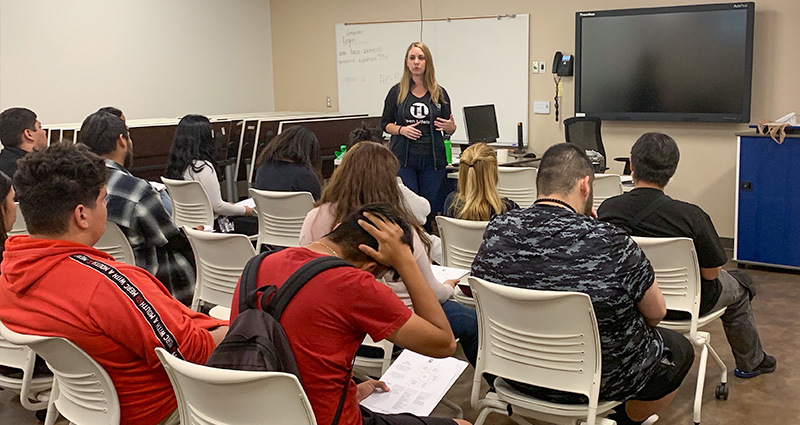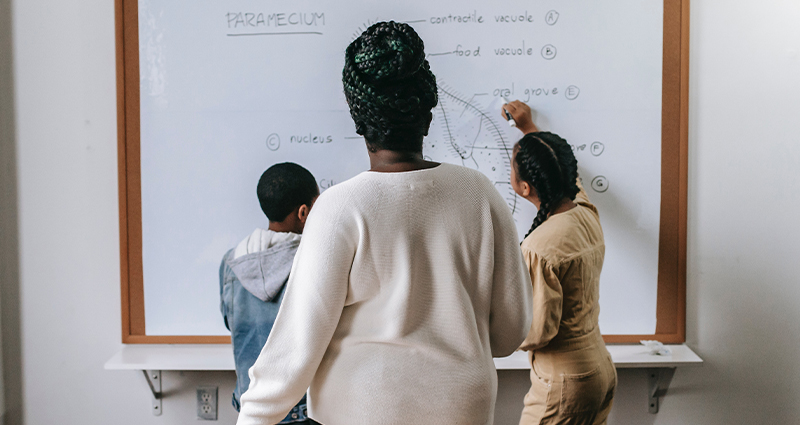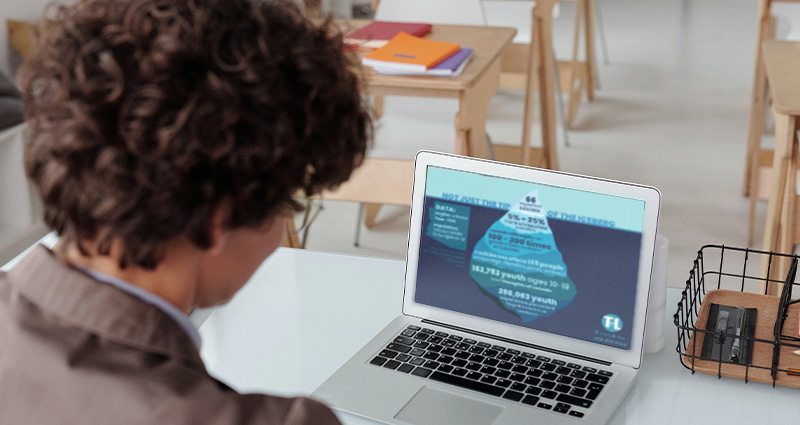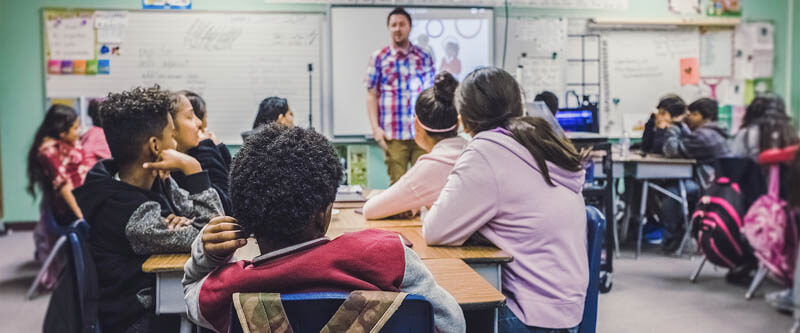
Suicide Prevention for All Arizona Youth
Fostering resilience in youth takes all-around support and well-informed communities—something we support through our suicide prevention, intervention, and postvention services. Provided by master’s level clinicians and adhering to best practice standards, our free prevention trainings decrease risk, increase protective factors, and create resiliency in schools and across communities.
As per the Mitch Warnock Act signed into law in 2019, all Arizona schools are required to provide suicide prevention training to school staff working with grades 6th through 12th. Teen Lifeline’s team of master’s-level clinicians provides suicide prevention education that satisfies this requirement for both in-person and virtual classrooms.

Trainings for Adults and Schools
The community education piece of our comprehensive prevention program begins with training adults in the lives of teens. This ensures that teens who seek help from trusted adults will be successful in finding support. These trainings help adults become more comfortable and confident talking to teens about the problems they face.
Training Topics
This workshop provides information on risk factors, warning signs, motivations, and myths of teen suicide. We discuss child development and how it plays into teen suicide. Participants will learn how to identify and assess teens who are at risk or already thinking about suicide. Participants will leave with knowledge about community resources, confidence to talk with teens about suicide, and how to connect them to help. This training can be facilitated as a general suicide awareness training, or as a clinical training for school staff or other professionals.
This workshop covers a description of self-injury and its prevalence among youth, types of self-injuring behaviors, how to assess teens who are engaging in self-injury, safety planning, and how to have conversations with teens about self-injury. This workshop gives parents, school staff, and service providers the tools to best deal with this issue and how it interacts with suicidal behavior.
This workshop discusses how adolescents experience stress. We cover stressors, symptoms of stress, and how to support teens who are experiencing stress. Healthy and unhealthy coping skills will be discussed as well as strategies for building resiliency in teens.
This workshop covers how adolescents experience grief, different types of loss, the grief cycle, and how to support teens through this process. We discuss coping skills and how to identify when teens need outside help. Participants will learn strategies for talking with teens about grief and loss and will brainstorm community resources that may be helpful.
This workshop focuses on adolescent problem solving and peer conflict. Participants will learn strategies for teaching and modeling healthy problem solving, conflict resolution, and empathy. This workshop focuses on building resiliency in youth so that they are able to solve problems independently.

Classroom Workshops for Youth
The next step in our comprehensive approach is to facilitate workshops for youth. These interactive workshops take place in the natural classrooms of students in sixth through twelfth grade. In adherence to Best Practice Standards, workshops are conducted for groups of 10 to 35 students and last 45 minutes to 1 hour. Workshops are provided by Master’s level clinicians who can identify teens at risk and connect them to support and resources. Youth workshops focus on building resiliency and increasing help-seeking behavior.
Workshop Topics
This workshop includes myths, motivations, risk factors, warning signs, protective factors, and resources needed to understand teen suicide. Students will learn what they can do if they recognize these warning signs in a friend. Through this discussion, students are left with coping strategies and a list of safe adults to talk to as well as what to say to a friend who is thinking about suicide. This invaluable information increases help-seeking behavior so teens are able to help one another and save lives.
This workshop focuses on what stress looks and feels like for adolescents. Using self-assessments, students will gain a better understanding of how stress affects them personally. Students will discuss stressors, positive and negative stress, physical and emotional symptoms, and resiliency. This workshop covers healthy and unhealthy coping skills and discuss constructive strategies for managing stress.
This workshop covers what grief is, different kinds of loss, and physical and emotional symptoms of grief. The grief cycle is discussed as a way to better understand that grieving is a process that differs for each individual. Students will discuss ways of coping with grief to help with the healing process and will learn how to better support their peers when they are grieving.
This workshop teaches students to have empathy for others. Conflict resolution and problem solving skills are taught to empower students to resolve issues on their own. Students will also learn when and how to get adults involved when necessary.

Trainings That Satisfy the Mitch Warnock Act
Signed by Governor Ducey on May 9, 2019, the Mitch Warnock Act requires all schools (public & charter) statewide to provide suicide prevention training to school personnel who work with students grades 6th through 12th starting in school year 2020-21.
Currently, the following trainings apply for the Act’s requirements. Like all of our workshops, Teen Lifeline does not charge for staff time to provide these trainings. However, there may be fees for materials.
This three-hour training program by LivingWorks prepares “helpers” to identify persons with thoughts of suicide and connect them to suicide first aid resources. By the end, participants will be better able to identify people who have thoughts of suicide and connect a person with thoughts of suicide to a suicide first aid intervention caregiver. Participants include anyone who might want to help; minimum age is 15.
This two-day training program by LivingWorks prepares participants to identify and respond effectively to persons considering suicide. Research has shown that the ASIST model increases participants’ knowledge and confidence in responding to a person at risk of suicide and that intervention skills are retained over time. Participants include anyone who might want to help; minimum age is 16.
This eight-hour training program by the National Council for Behavioral Health introduces common mental health challenges for youth, reviews typical adolescent development, and teaches a 5-step action plan for how to help young people in both crisis and non-crisis situations.
This training by the American Foundation for Suicide Prevention aims to increase knowledge of the warning signs of youth suicide, so that teachers and other adults who work with teens are better prepared to identify and refer students who may be at risk.

eLearning Lessons for School Staff
Our eLearning courses are individual online trainings specifically built for school staff (teachers, counselors, administration, coaches, etc.) that cover topics like crisis intervention, suicide postvention, and self-care for teachers. These trainings are designed to work in conjunction with our other trainings and the school’s crisis plan to help administrators, school staff, and faculty:
- Develop a culture that restores hope
- Encourage distressed people to seek help
- Build resilience and connectedness among a community after a tragedy
- Strategize communication with community partners
- Know how to bring in outside help
- Effectively use social media to share information
- Promote self-care and other suicide prevention efforts
Thanks to ARS 15-218, this course meets the requirements for school personnel to receive continuing education credits. Read more about the course topics below.
Approximate Time to Complete: 2 hours
Teachers are often the first adult to recognize a student experiencing mental health issues.
This training is designed to prepare Arizona school staff with the skills they need to identify students at risk for suicide and how to provide basic intervention in a crisis.
Register to request access to our Intervention eLearning unit.
Approximate Time to Complete: 2 hours
All of us can play a role in preventing suicide.
Suicide is a tragic and preventable loss for families and communities. This training is designed to help Arizona school staff promote a culture that restores hope, encourages distressed people to seek help, and builds resilience and connectedness among families and communities.
Register to request access to our Postvention eLearning unit.
Approximate Time to Complete: 45 minutes
Self-care—taking time to care for one’s own emotional and physical well-being—protects school staff from secondary trauma and burnout. It also provides support and positive role modeling for students. Learn what self-care is, signs of stress and burnout in teachers, how leadership can incorporate self-care into their school culture, and self-care strategies for teachers.
Request a Training
If you want Teen Lifeline to present at your school, organization, or community, please fill out the form below!
